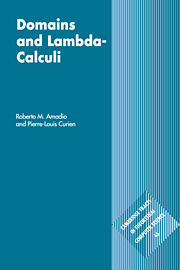Book contents
- Frontmatter
- Contents
- Preface
- Notation
- 1 Continuity and computability
- 2 Syntactic theory of the λ-calculus
- 3 D∞ models and intersection types
- 4 Interpretation of λ-calculi in CCC's
- 5 CCC's of algebraic dcpo's
- 6 The Language PCF
- 7 Domain equations
- 8 Values and computations
- 9 Powerdomains
- 10 Stone duality
- 11 Dependent and second order types
- 12 Stability
- 13 Towards linear logic
- 14 Sequentially
- 15 Domains and realizability
- 16 Functions and processes
- Appendix 1 Summary of recursion theory
- Appendix 2 Summary of category theory
- References and bibliography
- Index
4 - Interpretation of λ-calculi in CCC's
Published online by Cambridge University Press: 05 November 2011
- Frontmatter
- Contents
- Preface
- Notation
- 1 Continuity and computability
- 2 Syntactic theory of the λ-calculus
- 3 D∞ models and intersection types
- 4 Interpretation of λ-calculi in CCC's
- 5 CCC's of algebraic dcpo's
- 6 The Language PCF
- 7 Domain equations
- 8 Values and computations
- 9 Powerdomains
- 10 Stone duality
- 11 Dependent and second order types
- 12 Stability
- 13 Towards linear logic
- 14 Sequentially
- 15 Domains and realizability
- 16 Functions and processes
- Appendix 1 Summary of recursion theory
- Appendix 2 Summary of category theory
- References and bibliography
- Index
Summary
In first approximation, typed λ-calculi are natural deduction presentations of certain fragments of minimal logic (a subsystem of intuitionistic logic). These calculi have a natural computational interpretation as core of typed functional languages where computation, intended as βη-reduction, corresponds to proof normalization. In this perspective, we reconsider in section 4.1 the simply typed λ-calculus studied in chapter 2. We exhibit a precise correspondence between the simply typed λ-calculus and a natural deduction formalization of the implicative fragment of propositional implicative logic.
Next, we address the problem of modelling the notions of βη-reduction and equivalence. It turns out that simple models can be found by interpreting types as sets and terms as functions between these sets. But, in general, which are the structural properties that characterize such models? The main problem considered in this chapter is that of understanding what is the model theory of simply typed and untyped λ-calculi. In order to answer this question, we introduce in section 4.2 the notion of cartesian closed category (CCC). We present CCC's as a natural categorical generalization of certain adjunctions found in Heyting algebras. As a main example, we show that the category of directed complete partial orders and continuous functions is a CCC.
The description of the models of a calculus by means of category theoretical notions will be a central and recurring topic of this book. We will not always fully develop the theory but in this chapter we can take advantage of the simplicity of the calculus to go into a complete analysis.
- Type
- Chapter
- Information
- Domains and Lambda-Calculi , pp. 71 - 104Publisher: Cambridge University PressPrint publication year: 1998

